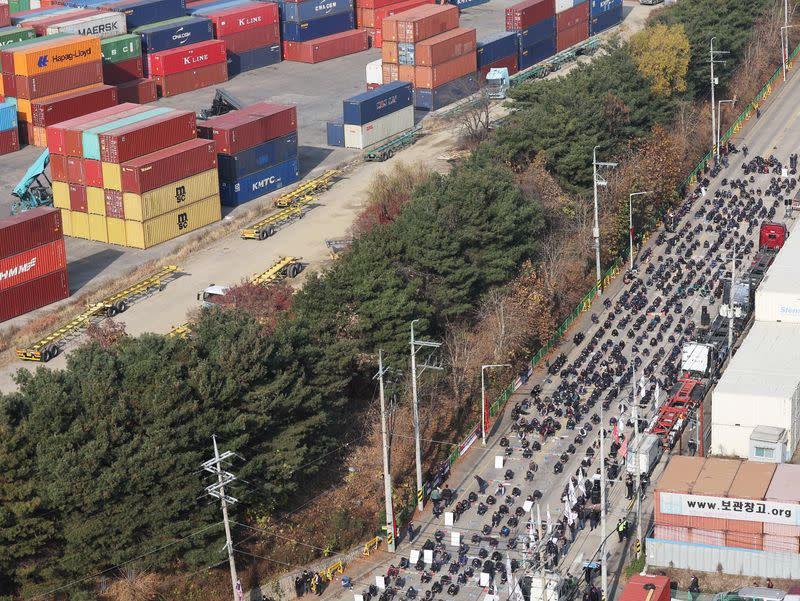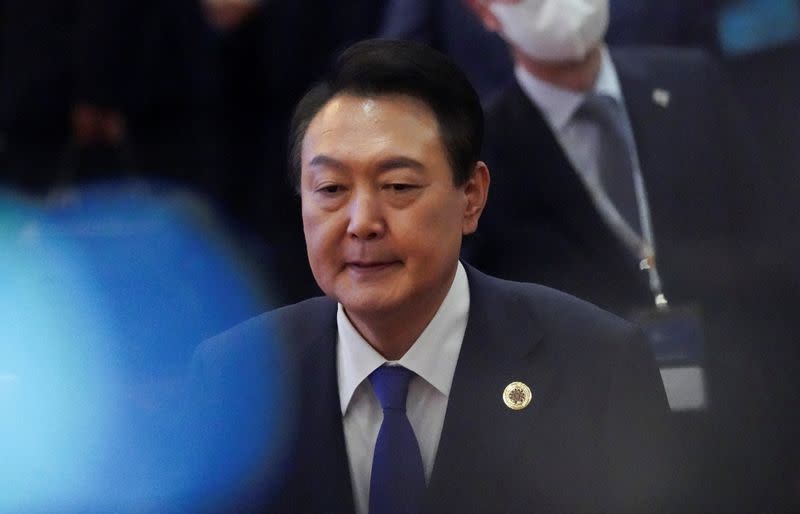Supply chains in South Korea have been disputed by a major strike by a truckers union seeking better pay and conditions.
South Korean President Yoon Suk-yeol has described the nationwide strike as an illegal and unacceptable move to hold the national supply chain “hostage” during an economic crisis.
Yoon warned that the government might step in to break up the strike by thousands of unionized truckers, which is already disrupting supplies to automakers, the cement industry and steel producers in the world’s 10th-largest economy.
Union officials said there were no ongoing negotiations or dialogue with the government. The transport ministry said it had requested talks with the union on Thursday, but the parties have yet to agree on a date.
Union officials estimated about 25,000 people were joining the strike, out of about 420,000 total transport workers in South Korea. The transport ministry said about 7,700 people were expected to rally for the strike on Friday in 164 locations nationwide, down from 9,600 people on Thursday.
The strike has the potential to have a severe economic impact. An eight-day stoppage in June cost more than $1.2 billion in lost output and unmet deliveries.
ALSO SEE:
China Banks Promise Ailing Developers $162 Billion in Credit
Exports Falling
“The public will not tolerate taking the logistics system hostage in the face of a national crisis,” Yoon said in a Facebook message late on Thursday, noting that exports were key to overcoming economic instability and financial market volatility.
“If the irresponsible denial of transport continues, the government will have no choice but to review a number of measures, including a work start order.”
According to South Korean law, during a serious disruption to transportation the government may issue an order to force transport workers back to their jobs. Failure to comply is punishable by up to three years of jail, or a fine of up to 30 million won ($22,550).
Were the government to take this option, it would be the first time in South Korean history such a order is issued.
The strike comes after South Korea saw October exports fall the most in 26 months as its trade deficit persisted for a seventh month, underlining the slowdown in its export-driven economy.
Amid the economic gloom, Yoon’s approval rating remained mostly flat for the fifth week at 30%, according to Gallup Korea on Friday, although his focus on economic affairs received a positive response.

Truckers Camp
Outside the gate of the container depot at transport hub Uiwang, dozens of unionised truckers have set up camp and are staying overnight in white tents, watched by patrolling police although the strike has been peaceful so far.
“We are going to pour everything, resources and money, and execute every strategy we have,” said Lee Young-jo, director-general at the Seoul metropolitan chapter of the Cargo Truckers Solidarity Union (CTSU).
Lee said apart from existing funds, the union will collect emergency funds among its members if the strike is prolonged. “We are desperate, but the government and politicians are calculating their political gains and not sincerely hearing us,” he said.
As opposed to a previous walkout in June that was focused on hampering transport of containers, cement and cars, the union planned to expand their targets and disrupt supplies of groceries and fuel, Lee said.
The head of the union, Lee Bong-ju, said the truckers had no choice but to strike after the government stalled negotiations.
“The Yoon Suk-yeol government is threatening a hard-line response without any efforts to stop the strike,” he told reporters on Thursday.
Disrupted Logistics
On the first day of the strike, the Korea International Trade Association (KITA) received 19 reports of cases of disrupted logistics. These included inability to bring in raw materials, higher logistics costs and delivery delays leading to penalties and trade with overseas buyers being scrapped.
In one instance, raw materials for a chemical company were delivered under police protection after the transport vehicle was blocked by striking truckers from entering a factory, KITA said.
The cement industry sustained an output loss of an estimated 19 billion won ($14.3 million) on Thursday, lobby group Korea Cement Association said, after shipments slumped to less than 10,000 tonnes due to the strike.
This compares with South Korea’s 200,000 tonnes of cement demand per day in the peak season between September and early December. Construction sites are at risk of running out of building materials after the weekend.
The industry ministry said the steel sector also saw shipments drop on Thursday. Posco, the country’s largest steelmaker, declined to comment on the extent.
Meanwhile, workers at Hyundai Motor’s Ulsan factory are expected to drive about 1,000 new cars to customers directly on Friday, after delivering about 50 cars on Thursday, a representative of a separate union at the factory told Reuters. So far there was no impact on auto output, the official said.
Drivers recruited by Hyundai Motor‘s logistics affiliate Hyundai Glovis also began delivering some Kia Corp cars by driving them directly from Kia’s Gwangju plant to customers, a Kia official told Reuters.
The official didn’t say how many Kia cars would be delivered directly to buyers.
- Reuters with additional editing by Jim Pollard
ALSO SEE:
China Keen to Speed up Free-Trade Talks With South Korea: Xi
South Korean Economy Slowing, October Exports Fall 5.7%
Samsung Says it Will Proceed with Huge Spending Plans
South Korean Chipmakers Seen Avoiding US Chip Crackdown
























